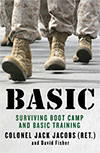Top 10 Summer Reading Books
By TLDG, Monday, June 25, 2018
Summer reading is not just for children. Vacation days with the family, "summer Fridays", and longer days with sunlight pose the perfect time to learn something new. The leadership benefits of reading are wide-ranging. Evidence suggests reading can improve intelligence and lead to innovation and insight. It can also make you more effective in leading others by making you a more adept and articulate communicator. Reading is also the best way to relax, as reading for six minutes can reduce stress by 68%, according to new research by Mindlab International at the University of Sussex.
Put down the fiction book and pick up one of these books recommended by our TLDG Faculty to expand your mind on the topics of leadership, communication, team dynamics, and more.
Band of Brothers, by Stephen Ambrose
The iconic New York Times bestseller about the ordinary men who became the World War II’s most extraordinary soldiers. In the process, they learned selflessness and found the closest brotherhood they ever knew.
Exception to the Rule: The Surprising Science of Character-Based Culture, Engagement, and Performance, by Peter Rea et al.
Wise leaders help their people practice character to navigate their way through turbulence, without lowering performance expectations. As a result, their people are more reliable under pressure.
The Boys in the Boat: Nine Americans and Their Epic Quest for Gold at the 1936 Berlin Olympics, by Daniel Brown
The story of 9 working-class boys who transformed the sport of rowing, reaffirming the American notion that merit outweighs prestige and power, and showing what can be done when everyone quite literally pulls together.

Leaders Eat Last: Why Some Teams Pull Together and Others Don’t, by Simon Sinek
The New York Times bestseller about why some teams trust each other so deeply they would literally put their lives on the line for each other, and why other teams, no matter what incentives are offered, are doomed to infighting, fragmentation and failure.
12 Rules for Life: An Antidote to Chaos, by Jordan Petersen
This international bestseller discusses discipline, freedom, adventure and responsibility; distilling the world's wisdom into 12 practical and profound rules for life.
The Killer Angels: The Classic Novel of the Civil War, by Michael Shaara
This Pulitzer Prize–winning masterpiece is unique, sweeping, unforgettable – the dramatic story of the battleground for America’s destiny. Two armies fought for two conflicting dreams. One dreamed of freedom, the other of a way of life.

New Power: How Power Works in Our Hyperconnected World – And How to Make it Work For You, by Jeremy Heiman and Henry Timms
The definitive guide to spreading ideas, building movements, and leaping ahead in our chaotic, connected age. Shines fresh light on the cultural phenomena of our day, from #BlackLivesMatter to the Ice Bucket Challenge to Airbnb, uncovering the new power forces that made them huge.
Team of Rivals: The Political Genius of Abraham Lincoln, by Doris Kearns Goodwin
Illuminates Lincoln's political genius, as the one-term congressman and prairie lawyer who rose from obscurity to prevail over three gifted rivals of national reputation to become President of the United States. He brought disgruntled opponents together, created the most unusual cabinet in history, and marshaled their talents to the task of preserving the Union and winning the Civil War.
Mindset: The New Psychology of Success, by Carol Dweck
The power of mindset is a simple but powerful idea. Success can be dramatically influenced by how you think about your talents and abilities. People with a fixed mindset – those who believe that abilities are fixed – are less likely to flourish than those with a growth mindset – those who believe that abilities can be developed.
Into the Storm: A Study in Command, by Tom Clancy and General Fred Franks
An in-depth look at the operational art of war from one of the greatest American military triumphs since World War II: the Gulf War. Includes personal stories from General Franks, who lost part of a leg in that war, and how he struggled and largely overcame the limitations of this injury.







